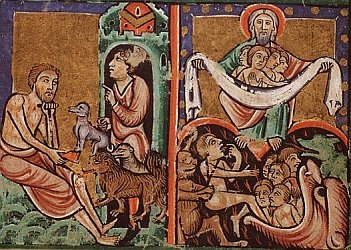Question 2: "Who goes to Heaven and who goes to Hell?"
I have an immediate reaction to this question: I cringe. I cringe because the first thing I hear is the sentiment expressed in the children's Bible song that glibly sings, "One door and only one and yet its sides are two. I'm on the inside; which side are you?"* This question about Heaven and Hell could be a meager attempt at self-assured good standing with God further bolstered by condemnation of others, a selfishness in the name of Christ. There are, however, other ways to hear this question.
 Who will go to Heaven? Or rather, how do I obtain life even after death? If this is what we mean, it is a frequent and good question found in the New Testament. See Luke 10:25-37, Mark 10:17-27 / Luke 18:18-27, and Acts 16:25-34 for some great examples. Jesus' answer is very rigorous: we are to be perfect just as God is perfect (Matt. 5:48). Impossible, right? Yes. Absolutely. (see Rom. 3:23) But Jesus also says, "What is impossible for mortals is possible for God." (Lk. 18:26-27) This is why the apostles in Acts and the in the Epistles, like Romans, teach that it is believing in Jesus - meaning active trust in, submission to, and the mimicking of Jesus - that leads to salvation. In Jesus, God does for us and in us and through us what we, on our own, find impossible.
Who will go to Heaven? Or rather, how do I obtain life even after death? If this is what we mean, it is a frequent and good question found in the New Testament. See Luke 10:25-37, Mark 10:17-27 / Luke 18:18-27, and Acts 16:25-34 for some great examples. Jesus' answer is very rigorous: we are to be perfect just as God is perfect (Matt. 5:48). Impossible, right? Yes. Absolutely. (see Rom. 3:23) But Jesus also says, "What is impossible for mortals is possible for God." (Lk. 18:26-27) This is why the apostles in Acts and the in the Epistles, like Romans, teach that it is believing in Jesus - meaning active trust in, submission to, and the mimicking of Jesus - that leads to salvation. In Jesus, God does for us and in us and through us what we, on our own, find impossible.Exactly what it is that Jesus does that we can't or didn't do is a whole other discussion. It's called the Theology of Atonement. Suffice it to say, we were locked out of eternal life until we received the key, and that key is Jesus.
"What about those who don't believe in and follow Jesus? Do they go to Hell?" The catch in this question is this other question: "Who, exactly, believes and follows Jesus?" Jesus says, "Not everyone who says to me 'Lord, Lord,' will enter the kingdom of heaven, but only one who does the will of my Father in heaven." (Matt. 7:21) Jesus anticipates that some are not the followers of Christ they thought themselves to be. It is God, not we ourselves, who determine what it is to 'do the will of the Father.'
 |
| A depiction for the Parable of Lazarus and 'Dives' |
On this point, I particularly like C.S. Lewis' book, The Great Divorce. In it Lewis tells the metaphorical story of a handful of Hell's denizens taking a day trip to Heaven. They are, for all intents and purposes, offered salvation and Heaven. But they refuse to let go of those imperfect and foul traits that cannot be a part of Heaven's paradise. The result is that they, by their own choice, would rather be in Hell than in Heaven.
 The point is this. God will do anything and everything possible, even doing the impossible, to rescue each of us from sin, evil, and death. This we can trust by knowing God and God's character. But we don't know the ultimate results for others. And perhaps it is none of our business either. "...Work out your own salvation with fear and trembling," says St. Paul (Phil. 2:12b). Let God's love, not our own worries, anxieties, or judgments, be the place where the fates of others rest. And take hope what Jesus has said, "I have other sheep that do not belong to this fold. I must bring them also..." (John 10:16a).
The point is this. God will do anything and everything possible, even doing the impossible, to rescue each of us from sin, evil, and death. This we can trust by knowing God and God's character. But we don't know the ultimate results for others. And perhaps it is none of our business either. "...Work out your own salvation with fear and trembling," says St. Paul (Phil. 2:12b). Let God's love, not our own worries, anxieties, or judgments, be the place where the fates of others rest. And take hope what Jesus has said, "I have other sheep that do not belong to this fold. I must bring them also..." (John 10:16a). I commend this prayer to you...
Almighty God, we entrust all who are dear to us to your never-failing care and love, for this life and the life to come, knowing that you are doing for them better things than we can desire or pray for; through Jesus Christ our Lord. Amen.
(The Book of Common Prayer, p. 831)